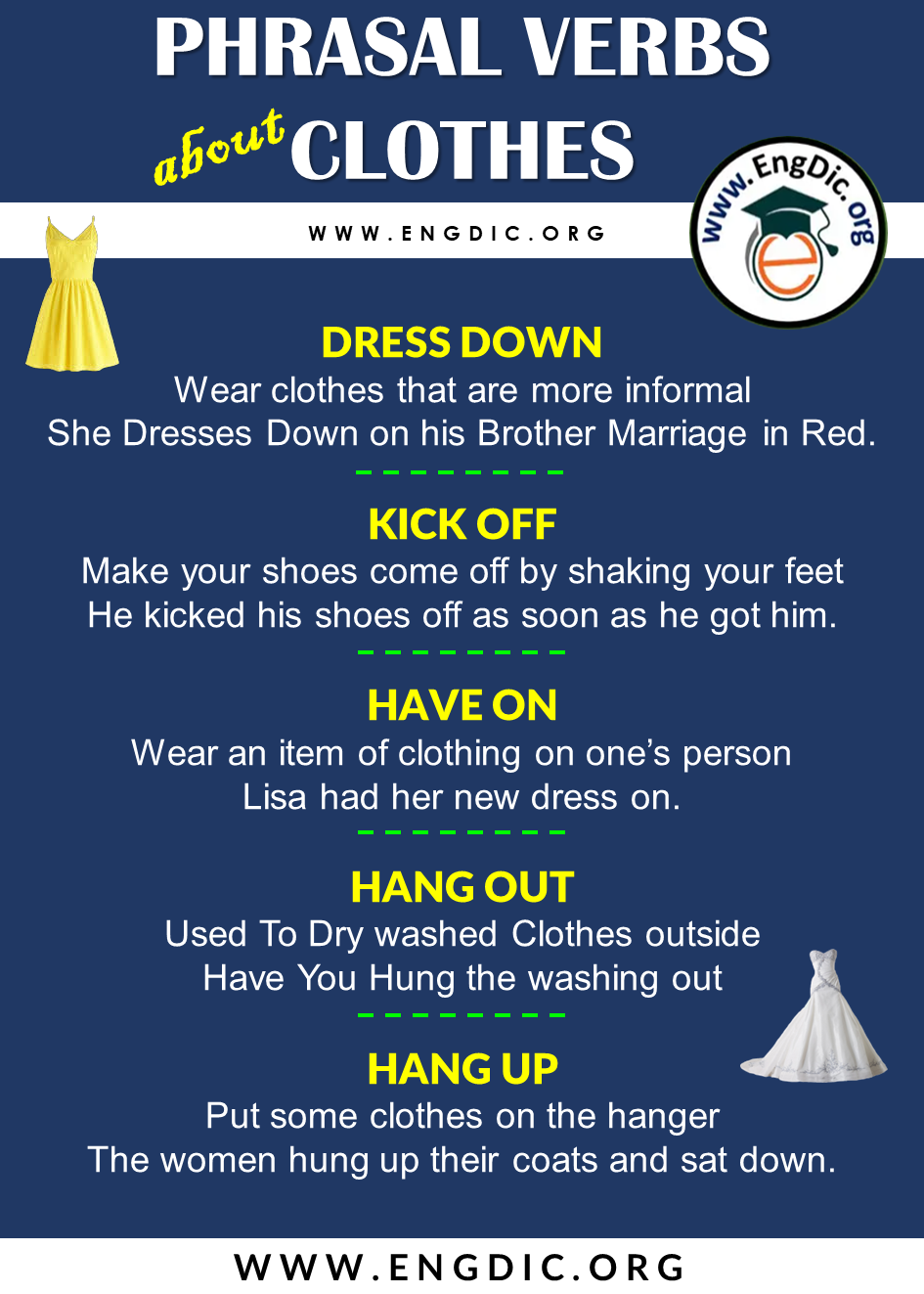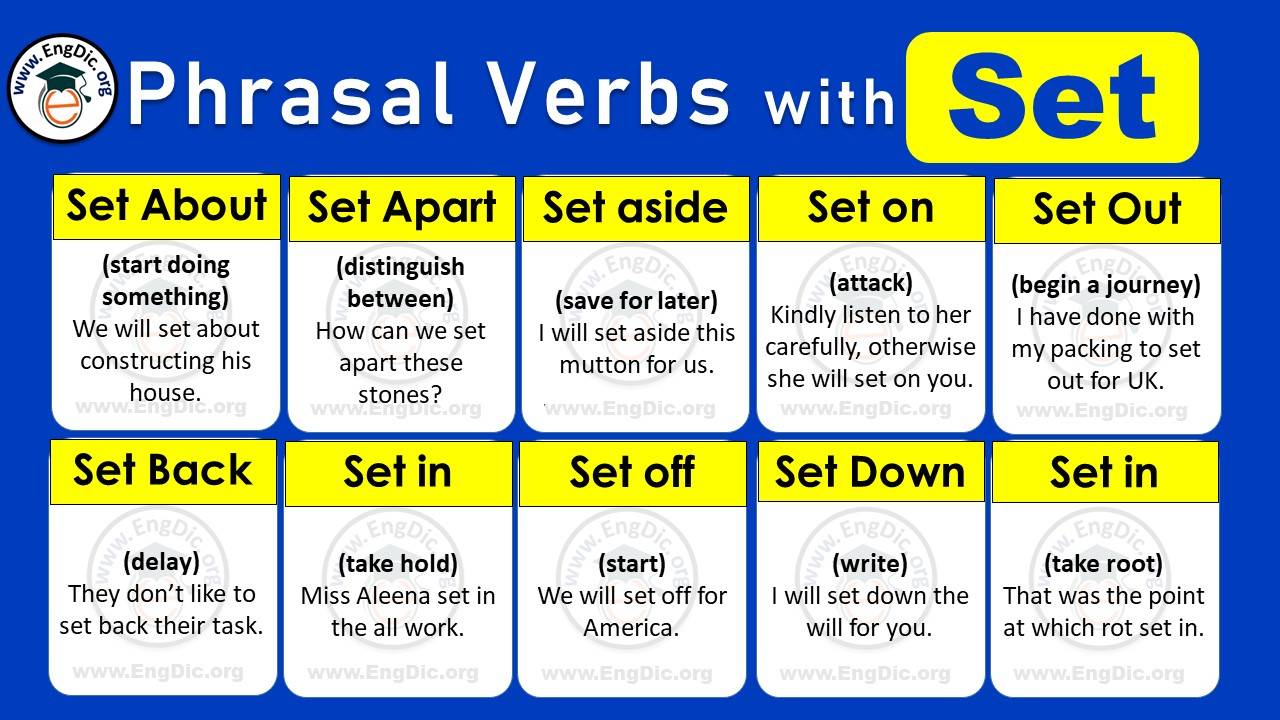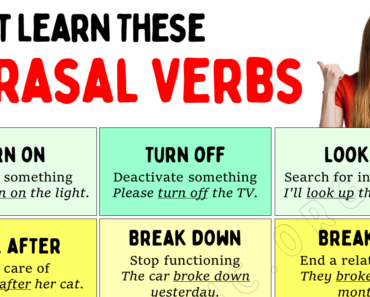Phrasal verbs are a crucial part of the English language and are used extensively in daily conversations. Understanding and using them correctly can significantly improve your fluency and comprehension. In this article, we will explore 2000 phrasal verbs, their types, and meanings, and provide example sentences to help you understand their usage better.
Phrasal verbs are formed by combining a verb with one or more particles, such as adverbs or prepositions. They can be separable, where the particle can be placed between the verb and the object, or inseparable, where the particle must remain attached to the verb. The different types of phrasal verbs include transitive, intransitive, reflexive, and phrasal-prepositional verbs.
Each phrasal verb has its unique meaning, and it is essential to understand it in context to use it correctly. For instance, “bring up” means to raise a topic or a child, while “bring about” means to cause something to happen. In this article, we will provide meanings and example sentences for 2000 commonly used phrasal verbs, including both formal and informal usage.
We have also included a PDF that you can download for offline use, which contains all 2000 phrasal verbs, their meanings, and example sentences. We hope this comprehensive guide will help you to master phrasal verbs and improve your English language skills.
In English traditional grammar, a phrasal verb is the combination of two or three words from different grammatical categories. Below is the long list of phrasal verbs with meaning and sentences.
Types of Phrasal Verbs
Phrasal verbs are a type of multi-word verb in English that consist of a verb and one or more particles (such as adverbs or prepositions). There are several types of phrasal verbs in English, which are:
- Intransitive phrasal verbs: These are phrasal verbs that do not take an object. They are usually followed by an adverb or preposition. Examples include:
- He ran away.
- She woke up early.
- Transitive phrasal verbs: These are phrasal verbs that take an object. The object can be either a noun or a pronoun. Examples include:
- She turned off the lights.
- He picked up the phone.
- They put on their jackets.
- Separable phrasal verbs: These are phrasal verbs in which the particle can be separated from the verb and placed after the object. Examples include:
- She turned the lights off. (The particle “off” can be separated from the verb “turn” and placed after the object “lights”.)
- He picked the phone up. (The particle “up” can be separated from the verb “pick” and placed after the object “phone”.)
- Inseparable phrasal verbs: These are phrasal verbs in which the particle cannot be separated from the verb. Examples include:
- She put on her jacket. (The particle “on” cannot be separated from the verb “put”.)
- They looked after their children. (The particle “after” cannot be separated from the verb “look”.)
- Phrasal verbs with a literal meaning: These are phrasal verbs in which the meaning of the verb and the particle can be understood literally. Examples include:
- She looked up the word in the dictionary.
- He sat down on the chair.
- They walked along the beach.
- Phrasal verbs with an idiomatic meaning: These are phrasal verbs in which the meaning of the verb and the particle cannot be understood from the literal meanings of the words. Examples include:
- She broke up with her boyfriend. (Meaning: She ended the relationship.)
- He came up with a new idea. (Meaning: He thought of a new idea.)
- They ran into each other at the store. (Meaning: They met unexpectedly.)
In conclusion, phrasal verbs are a common part of the English language and can take different forms and meanings. It’s important to understand these different types of phrasal verbs to use them effectively in communication.
List of Phrasal Verbs with Meaning and Sentences
List of Phrasal Verbs with Bear
Bear away: to win, to carry off as a conqueror,
He bore away the first prize in the essay competition.
Bear out: to confirm
Your story bears out my truth.
Bear up:
You should bear up the hardships of life bravely.
Bear with:
I could not bear this angry mood.
Bear upon: pertaining to
History does not bear upon the matter under discussion.
Bear on: refer to
The fact does not bear on the matter under discussion.
Bear up against: to resist, to endure
He bore up against all his hardships with a smile on his face.
Bear down: to crush by force
He bore down Lis enemy with a heavy hand,
Bear down upon: attack of a warship on the ship of an energy
The Pakistani battleship bore down upon the Indian warship and gave it a crushing defeat.
Bear to:
I cannot bear to see my son going to school without books.

Phrasal Verbs with Blow
Blow up: to explode
Suddenly, the mine blew up.
Blow away: to be carried away by the wind.
The teacher was blown away by the poems written by his students.
Blow out: to extinguish
Blow out the candle when you go to bed.
Blow over: to pass by
The storm will soon blow over.
Blow-down: to be thrown down by the force to wind
The storm blew down several large trees.
List of Phrasal Verbs with Break
Break-away: to free oneself from restraint.
He held the horse by the bridle but it broke away.
Break down:
His health has broken down due to hard work.
Break off: to stop suddenly
He broke off in the middle of his speech.
Break-in: to tame
He broke in the wild lion in no time.
Break into: to enter forcibly
The thieves broke into his house last night.
Break forth: to come out suddenly
The sun broke forth from the clouds.
Break-through: to enter forcibly.
The robbers broke through the wall of the house.
Break up: (i) to come to an end
Their marriage broke up as a result of long separations.
Break with: (i) to cease to be friendly with
He broke up with his sincere friend without any reason.
Break open: to open with force.
The thief broke open the window of my house last night.
Break out: to spread
Cholera has broken out in the city nowadays.
Break at: to make a better record.
He broke at his previous record in cricket.
Break-in upon: to interrupt by a sudden and unexpected appearance.
The police broke in upon the robbers in a lonely place.

Phrasal Verbs with Bring
Bring about: to cause
His lack of hard work brought about his failure.
Bring down: to humble down
His failure brought down his sense of honor.
Bring forward: put forth
He brought forward a strange proposal.
Bring forth: to produce
This tree will bring forth fruit soon.
Bring on: to cause, to begin
Goodbye, good times, and good wine; bring on the boxed stuff and bills.
Bring over: to persuade.
I could not bring him over to my point of view.
Bring up: look after during childhood.
I was brought up by my uncle in my childhood.
Bring under: to subdue
The mutiny was soon brought under control.
Bring round:
To cause to recover several boys fainted in the heat but the doctor soon brought them around.
Bring off: to rescue
The merchant brought off the deal.
Bring to: taken
The matter was brought to my notice.
Bring about: cause to happen
They felt the need to bring about a renewal of society.
Bring one to:
The doctor brought the senseless girl with smelling salts.
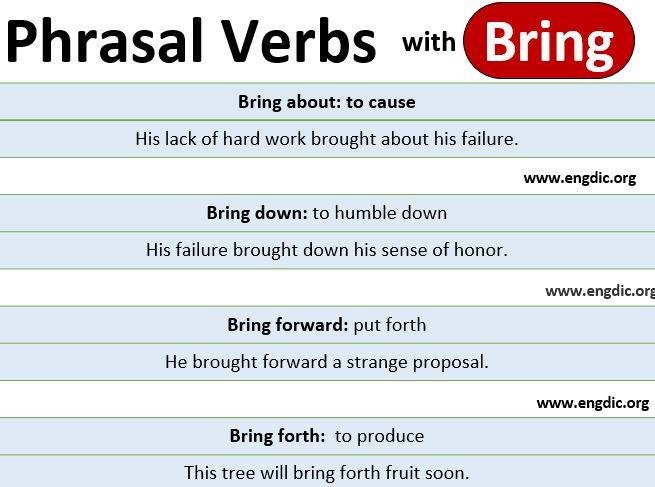
Phrasal Verbs Call
Call at: to visit someplace.
I called his house but he was not present.
Call on: to pay a brief visit to
He called on the principal in the evening.
Call upon: to pray
He called upon God in his difficulties.
call out: to utter loudly.
He called me out for help.
Call up: to recollect
I called up the name of my students to pronounce them with great order difficulty.
Call over:
The teacher called over the names of his students in the class.
Call off:
The workers called off the strike.
Call in: ask to come
Please call the doctor at once.

Phrasal Verbs with Carry
Carry away:
He was carried away by the song of Noor Jehan.
Carry off: to kill
Cholera carried off the life of many people.
Carry out: to obey
Please carry out my orders as soon as possible.
Carry through: to bring success to a full end
His courage will carry him through.
Carry on: to continue
Please carry on with your work.
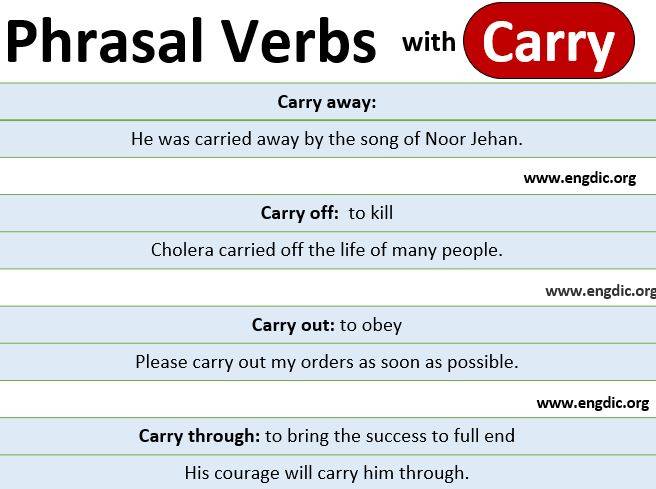
List of Phrasal Verbs with Cast
Cast aside: to reject.
Do not cast aside the love of truth.
Cast away: to throw away
The soldier has to cast away their heavy luggage during the battle.
Cast down: (i) to humble down (ii) to feel disappointment.
He was much cast down by his failure in business.
Cast out: to expel
The Muslims were cast out of Palestine.
Cast up: to calculate
Please cast up the account for the sale of this furniture,
Cast oneself on: to entrust oneself
I had to cast myself on his cold behavior, because Of my poverty.
Cast about for: to look for
He will cast about for a chance to harm you.

Phrasal Verbs with Come
Come down: to be reduced
The prices of cotton have come down.
Come from: to descend from
He comes from a noble family.
Come Off: To take place
When does your marriage come off?
Come by: to acquire
How did you come by this watch?
Come round: to recover
It is hoped that he will come round soon.
Come out: to become public, to appear.
Several new books have come out this year.
Come out of: to get clear of
He came out of all hardships.
Come on: to grow or thrive
The plants are coming on very soon.
Come over: to come into one’s mind
He came over to me to see her again.
Come to arrive: at the result
He did not come up to the expectation of his father.
Come up: to be raised
The question of co-education came up in the meeting.
Come up with: to overtake
A man on a cycle can come up with a traveler in Tonga.
Come at: to get within reach of, to attain.
I saw the fruit on the tree but it was too high for me to come at.
Come upon: Meet with an accident
He came in for a good deal of property after the death of his uncle.
Come in: to come near, to begin
The flood is coming in.
When did this fashion of hairstyle come in?
Come about: to happy especially in a way that seems impossible to control
How did the solution to the Kashmir problem come about?
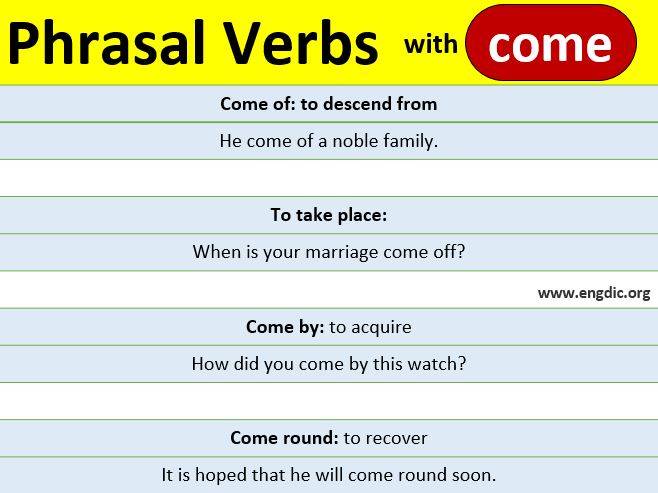
Phrasal Verbs with Cut
Cut down: to kill
Cholera cut down many people in this village last year. Please cut down your
Cut off: (i) to destroy (ii) to kill
How many men are cut off in their youth?
Cut out: to stop the habit.
You should cut out the habit of smoking.
Cut across: taking a short route.
They were in a hurry, so they cut across the fields.
Cut out for: to be suitable
He is not cut for that sort of work.
Cut in: to interrupt, to enter quickly
He cut me in while I was making a speech.
Cut up: to cut to pieces.
The butcher cut up the animal, he has slaughtered.
Cut away: to run off and escape
He cut away across the field, on seeing the police.
Cut on: to be in hurry.
We cut on in spite of the darkness.
Cut through: to experience
He cut through all hardships of life quite bravely.

Phrasal Verbs with Do
Do away: to remove, to destroy
Let us do away with evil customs.
Do out: to cheat
He did me out of a large sum of money.
Do up: to decorate, to arrange.
She is doing up her hair.
Do without:
He cannot without my help.
Do into: to suit instead, to serve
Please do this story into verses.
Do with: to make use of
What will you do with the bundle of clothes?

List of Phrasal Verbs with Fall
Fall back: to retire
The enemy fell back before our attack
All back upon: to resort to
He fell back upon the money of his father after his death.
Fall in with: to meet accidentally.
I fell in with an old friend on my way.
Fall out: to quarrel
He fell out with me over a trifle
Fall upon: to attack
The thieves fell upon the passenger in the dead of night.
Fall away: to become lean
My cow has quickly fallen away in flesh.
Fall into: to fall into
I fell into the magic of his conversation.
Fall off: to come under
Even sincere friends fall off in adversity.
Fall under: to come under.
You do fall under the group of dull students.
Fall behind: be unable to keep up with others.
He is always behind when we are going up a hill.
Fall to: Apply oneself
The author falls to writing again.
Phrasal verbs with Get
Get about: to go about
He is too weak to get about.
Get away: to escape
The thief got away with the watch.
Get down: to enter.
The passenger got down the train.
Get into: to enter
He got into the room by force.
Get on: to advance
How do you get on with your study?
Get over: to overcome
He got over his difficulties soon.
Get out: to escape, to go outside
The women fell into the well and could not get out.
Get out of: escape from
He tried to get out of helping his friend.
Get through: to succeed
He got through the examination by dint of hard work.
Get up: to rise from the seat
He got up and locked the door.
Get forward: to advance
I hope you are getting forward in your studies.
Get off: to escape
He got off with a beautiful girl.
Get along: to proceed, to advance
He seems to be getting along well in his business.
Get back: to return
He has just got back from his long journey.
Get above: higher than
He has got above his misfortune.
Get in:
As soon as he saw me, he tried to get in my car.
Get around a person: to prevail upon
She knows how to get around her husband.
Get at the bottom of: to arrive at the truth
The police are trying to get to the bottom of this murder.
Get away with: abscond with
He got away with a large sum of money.

List of Phrasal Verb with Give
Give away: to distribute
The principal gave away the prizes to the winner.
Give in: yield
The Indian Army gave in before our soldiers.
Give out: to announce
It is given out in the newspaper that the Prime Minister has fallen ill.
Give up: to hand over.
He has given up smoking forever.
Give over: to hand-over
I gave him over charge of my office.
Give into: to submit
He gave in to the wish of his father.
Give back: to return
I gave him back his pen.
Give off:
Some flowers give off their fragrance at night.
Give upon: lookout on
The window gives upon the street.
Give to: addicted to, habitual
He is given to drinking.
Give under: bend or yield
The wet playground gave under our feet.

Phrasal Verbs with Go
Go by: to judge from, to follow.
You cannot always go by appearance.
Go down: to go lower in price.
The prices of cotton have gone down.
Go off: to discharge.
The fire has gone off badly.
Go on: to continue
Let him go on with his work.
Go on with:
In spite of the noise, he went on with his work.
Go out: cease to burn.
This lamp went out at once.
Go up: to increase
The prices of sugar have gone up.
Go ahead: to advance
We went ahead with our studies.
Go against: to go contrary
He went against the wish of his father and married a foreign girl.
Go back on: to withdraw
It is not proper to go back on your promise.
Go in for: to like or choose a thing.
I have decided to go in for a new suit.
Go in: to enter
The peon opened the door and we went in.
Go into: to enter
He went into the room and arranged the furniture,
Go over: to examine
He went over the whole account item by item.
Go away: to depart
Malaria went away in winter.
Go aside: to go a little way off
Do not go aside from the path of truth.
Go about: to do something in a particular manner
Do you know how to go about painting this house?
Phrasal Verbs with Hold
Hold back: to conceal
You should not hold back anything from your parents.
Hold to: keep up
We were held up by the robbers.
Hold with: to agree
I do not hold with your views on politics.
Holdover:
The judge held over his case till the next hearing.
Hold to:
Do you still hold to your plan of taking the examination again?
Hold on: to continue
The rain held on steadily all afternoon.
Hold out: to refuse to yield.
The Pakistani Army held out in face of danger.
Hold on: to keep at a distance.
We must hold off the enemy’s attack.
Hold back: to hesitate
When danger came, all held back.
Hold by: having caught hold
He held me by my neck.

Phrasal Verbs with Keep
Keep at: to continue doing
Please! Keep at your work and finish it soon.
Keep: to conceal
I shall keep nothing pack from you.
Keep down: to hold in subjection
It is very difficult to keep down the mountain tribes.
Keep from: to abstain or refrain from
He could not keep from the use of smoking.
Keep in with: to remain in good terms
Please try to keep in with your doctor always.
Keep on: to continue
I am tired of this work, but I still keep on.
Keep under: under control.
The fireman managed to keep the fire under.
Keep up: to maintain.
Keep up your courage in face of hardships
Keep to: Stick to
You should keep to your moral values strictly.
Keep out:
These arm clothes will keep out cold.
Keep off:
Please keep off the grass.
Keep together:
They agreed to keep together during the evening.

Phrasal Verbs with Lay
Layby: to store for future use.
Layby something for the rainy day.
Lay down: to sacrifice
He laid down his life for the sake of his country.
Lay out: to invest
I have laid out a large amount of money in his business.
Lay-up with: To be confined to bed
He was laid up with a fever for many days.
Lay aside: Put away, to forget
Please lay aside your shyness.
Lay in: to store
He laid in a large quantity of rice in his house.
Lay before: to present
He tried to lay the paper before the Governor.
Lay on: to apply blow with force.
The policeman caught the thief and laid on

Phrasal Verbs with Live
Live on: continue to live.
The people died but the young ones lived on.
Live out: remain alive through
He will not live out another week.
Live through: live after sufferings and sorrows
He has lived through that war and revolution.
Live up to: to act up to.
He did not live up to his fame.
Live for: to devote one’s life
Some men live for nothing else but to collect money from others.
Live by: live on
I live by hard labor.
Live at:
He lives in the USA.
Phrasal Verbs with Look
Look
Look after: to take care of
There is none to look after the poor child.
Look upon: to hate
You should not look down upon the poor.
Look for: to search
He looked at his book but did not find it.
Look forward to: to expect eagerly
I am looking forward to summer vacation.
Look in: to examine carefully. Please look into this matter seriously.
Look over: to examine seriously
The headmaster was looking over some papers.
Look to: to depend
Do not look to him for help.
Look to: find
Look up this word in the dictionary.
Look up to: to find
He always looks up to his parents.
Look upon: to consider
I look upon him as my brother.
Look through: to examine the contents
He looked through the documents carefully.
Look about: to search what are you looking for?
Look back: to consider the past

Phrasal Verbs with Make
Make away with: to carry away
The thief made away with my books.
Make for: to move towards
The lion made for the jungle.
Make out: to understand
I cannot make out the meaning of this lesson.
Make towards: to go in the
The swimmer made it towards the net.
Make up to:
Many people made up to him only of his
Make after: to chase
He threw the ball and made after it.
Make up for:
We must make up for the lost title.
Make at: to attack
He made at her 10th a knife.
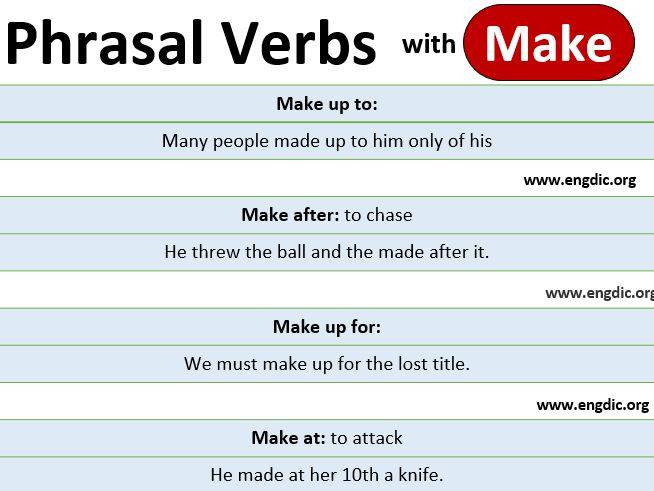
Phrasal Verbs with Pass
Pass away: to die
Mr. Karim passed away in the morning.
Pass through: to undergo
He has to pass through many hardships.
Pass by: to go by, to ignore
I passed by his mistakes and did not take him to tasks
Pass on: to proceed
Let us pass on the journey.
Pass from: to leave
Let us now pass from this; we have discussed long

Phrasal Verbs with Pull
Pull down: to demolish
This building is old, and it must be pulled down.
Pull in: to exert together
We should pull in e teams.
Pull away: to free one side
She tried to pull away from the man who was holding hers
Pull round: to restore health.
The doctor pulled him round his serious illness.
Pull up: to stop.
He pulled up his car at the gate.
Pull about: to pull from one side to the other.
He pulled about the gate and entered the house in rain.
Pull out: to draw out
Please pull out the pin.
Pull together: to work unitedly
All the members of the staff should pull together to improve the result.

Phrasal Verbs with Put
Put by: store in for future use.
You should put by something against the rainy day.
Put down: to crush
The king could not put down the enemy.
Put forth: to exert
He put forth to pass the examination.
Put on: to wear
Please put on your new clothes.
Put out: extinguish
Please put out the lamp.
Put up:
He is putting up with us these days.
Put up with: to endure
I cannot put up with my insult.
Put in: to submit
Please put in your application by tomorrow.
Put back: to restore to the original place
Put back this book in the place where you got it.
Put away: to preserve
Put your toys away in the cupboard when you have finished playing.
Put across:
I am not putting across my meaning very well.
Put in for: to lay claim to
I mean to put in for a share of the profits.
Put forward: to move forward
He will put forward his son as a candidate at the next election.
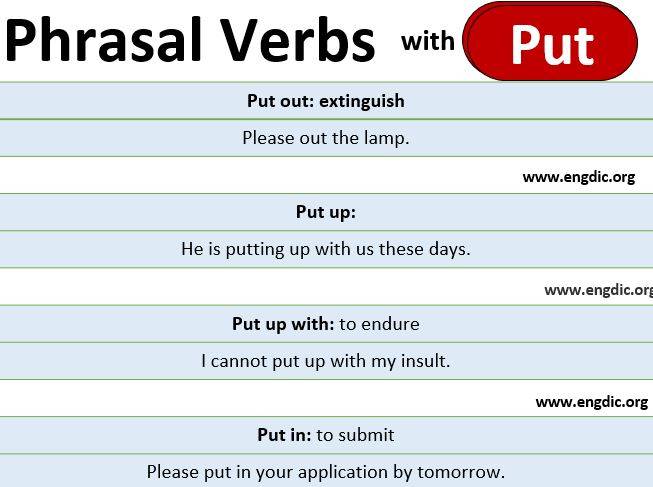
Phrasal Verb with Run
Run to: follow
The police ran after the thief and arrested him.
Run against: to collide
The ship ran against the rock.
Run down: to be enfeebled P.U. 2008
His health has run down.
Run into: to be involved
He has run into debt.
Run out: to end.
Our stocks of sugar have run out.
Run over: to overflow
A child was run over by a car.
Run through: to squander away.
He will soon run through his fortune.
Run up against: to collide with
My car ran up against a Bike last evening.
Run in: arrested
The thief was run in by the police.
To run off: to flee
The thief ran off as soon as he saw the police.
Run at: to attack
The lion ran at the farmer and tore him to pieces.
Run away: to flee
The soldiers threw down their arms and ran away.
Run up: to put up quickly
He has run up a house in the city.
Run across: to come by a thing by chance
I ran across an old photograph of mine yesterday.

Phrasal Verbs with Set
Set about: to begin.
Set about your business as soon as possible.
Set a part: to reserve
I have set apart some money for the poor.
Set aside: to disregard
Set aside all objections and listened to me.
Set down: to record, write
Please set down your plan as soon as possible.
Set in: to begin.
Rains have set in early this year.
Set off: to start
We shall set off to Lahore the next morning.
Set on, upon:
The dogs were set on the poor beggar.
Set out:
He has set out on his journey to Karachi.
Set to: to begin
They set to work and finished it in a day.
Get up: to establish
We have set up a factory here.
Set forth: to explain
He asked me to set forth my views on co-education.
Set up for: to claim
He sets himself for an experienced driver.

Phrasal Verbs with Stand
Stand for: to represent
He stands for intelligence.
Standoff: to remain aloof and honest.
Standoff from the company of drunkards.
Stand out: to look prominent
His work stands out from that of others.
Stand to: abide by
You should stand to your word and help him.
Stand over: to postpone
His meeting was stood overdue to rainfall.
Stand up for: to maintain
A gentleman stands up for his noble views.
Stand out against: refusal to yield
He stood against all our efforts to persuade him.
Stand up: to rise from the sitting posture
He stood up in the class and answered the teacher.
Phrasal Verbs with Take
Take after: to resemble.
She takes after her mother.
Take away: to remove
He has taken away my book.
Take for: to regard
He took me for a thief.
Take in: to deceive
I was taken in by his friendly manners.
Take off: to put off
Please take off your old coat and wear a new one.
Take over: assume
I took over the charge of this office yesterday.
Take to: addicted to
He has taken to drinking.
Take up: to begin a hobby
He took up cricket and became a very good player.
Take out: to extract.
The dentist took out two of his teeth.
Take from: to subtract
Take four from seven and three remain there.
Take back: to withdraw
I take back all I have said.

Phrasal Verbs with Turn
Turn away: to dismiss
He has turned away three applicants.
Turn to reject:
He has turned to reject my proposal.
Turn on: to start
Please turn on the radio.
Turn out: expel
The teacher turned the boy out of the class.
Turn up: to appear
Let us see what turns up next.
To beat off: an attack to repeat
Our army beat off attacks in the Sialkot sector.
Turn to: attend to
Turn to God for mercy and help.
Turn upon: attend to
His whole argument turned upon the advantages of co-education.
Turn back: drive back
Can any force turn back the coming storm?
Turn over: Turn something so that the other side becomes visible.
Turned over the page and went on reading.
Turn aside: to deviate
Never turn aside from the path of truth.
Turn in: to enter a house for a short visit
I turned in to enquire about his health.
How Many Phrasal Verbs are in English?
There are 10,000 to 20,000 phrasal verbs in English Language and that’s why it is very difficult to memorize them all. But you can learn some important phrasal verbs.
In this lesson, I have provided you with some of the common phrasal verbs along with meanings and examples.
Download the PDF of this lesson Phrasal Verbs with Meaning and Sentences below.
Download PDF
Other Related:


